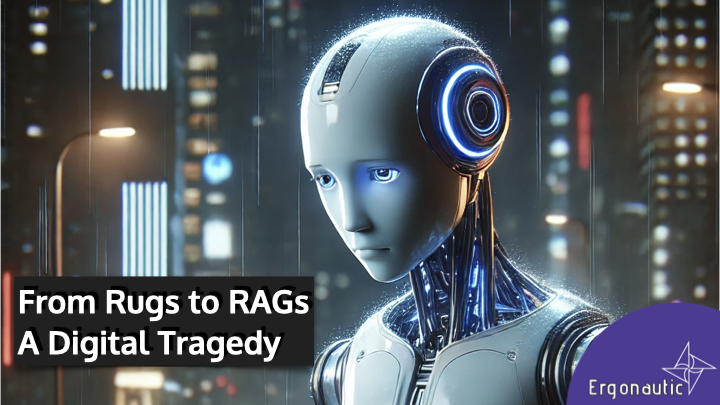
From Rugs to RAGs: a Digital Tragedy
I was born into a world without the Internet.
OK, technically, the Internet already existed, but for little Sasha, starting the first grade in Ukraine, then still a part of the Soviet Union, a computer was a fancy technology she read about in books, knowledge was to be acquired from a library, and when you made an appointment with a friend you had to show up at the correct time and place because there was no way to let them know you got delayed.
Then, the world changed.
By 16, I had a list of virtual friends on ICQ, connected with people in other countries via email, and carried a device in my pocket that allowed me to text my friends at any time of day and night, even if I had to press a key four times to generate the letter “s.”
For the next 25 years, the Internet brought me real human friends, access to all the serious knowledge humanity had ever generated, unlimited amounts of cat memes, and ALL of my professional jobs. People on the Internet shared ideas, content, and even software free of charge for the benefit of everyone.
By the late 2000s, the Internet also brought me better everything. Better Search. Better Library. Better Television. Better Taxi. Better Shopping. Better personal and professional communities. Internet companies continuously figured out faster and cheaper ways to deliver goods and services, all with a phenomenal user experience. Heavily subsidized by VC funding, these companies gave away their excellent services for free in pursuit of infinite growth. The barriers to entry were so low that a person with an idea and a laptop could start a multi-billion dollar company, and we all benefitted from the innovation.
In the B2B world, similar dynamics played out. Enterprise products and infrastructure, year over year, provided better user experiences and outcomes in all areas of business, often without breaking the bank.
Then, the world changed again.
In 2022, Corey Doctorow coined the term enshittification of platforms, saying, “here is how platforms die: First, they are good to their users; then they abuse their users to make things better for their business customers; finally, they abuse those business customers to claw back all the value for themselves. Then, they die.” He has some enlightening observations about the gradual enshittification of Amazon, Facebook, Google Search and more. This dynamic helps explain why every service I mentioned is now terribly expensive and expensively terrible.
Once a big company captures both sides of a two-sided market, it can charge business customers ever-increasing fees and continuously worsen the consumer experience by directing users almost entirely to paid results. After that, platforms often start to take out some of their business customers by offering the same service, as we have seen most vividly in the case of Google Reviews eliminating the need for Yelp, or “Amazon Basics” products competing with Amazon’s customers.
Today, GenAI companies are also disrupting the creators’ ability to use their work to make a living. Would creators still share their work (content, art, software) freely if GenAI removes all attribution and discoverability of the original resources? That is a topic for another article…
Still, I am missing an important piece of the puzzle.
Since lifetimes are short, I have never witnessed another major Blue Ocean where an industry goes from non-existence to oligopoly. What happens after software eats the world?
Are we forever destined to live with the established industry players because no new entrants have enough capital to stand a chance of disrupting them? Do we have to rely on developing government regulations to ensure that the oligopolies are prevented from pushing the externalities onto the public? Does a new technology develop, allowing the entire industry to pivot into a new space?
Many of my peers and clients resonate deeply with the growing frustration caused by the enshittification of the web. As technologists, we would like to wield our powers to make the world a better place. Can we turn this ship around?
Join us in the conversation of what comes next. Let’s think together!